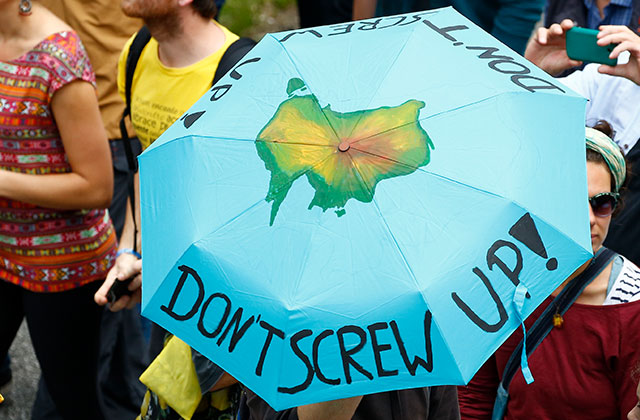The G-20 gathered in Hamburg, Germany over the weekend, and the world’s wealthiest countries left the summit even further distanced from President Donald Trump’s climate change policies—or lack thereof.
The Paris Agreement was a major topic during the summit, a meeting among the 20 wealthiest economies that’s taken place every two years since the 2008 financial crisis. The final text of the 2018 event highlights the U.S. stance on the international climate agreement:
We take note of the decision of the United States of America to withdraw from the Paris Agreement. The United States of America announced it will immediately cease the implementation of its current nationally determined contribution and affirms its strong commitment to an approach that lowers emissions while supporting economic growth and improving energy security needs. The United States of America states it will endeavor to work closely with other countries to help them access and use fossil fuels more cleanly and efficiently and help deploy renewable and other clean energy sources, given the importance of energy access and security in their nationally determined contributions.
The U.S. withdrew from the agreement in June, and at the time Trump proposed renegotiating parts of the agreement. World leaders immediately said this was not an option. The text from the G-20 reiterated this, stating: “The Leaders of the other G-20 members state that the Paris Agreement is irreversible.”
The document is also explicit in noting the countries’ commitments to helping developing countries adapt to climate change—which is critical given that the developing world will bear disproportionate impact from the manmade catastrophe. This will be done through the Green Climate Fund, of which President Trump is very critical. The fund sets aside money from developed nations for developing nations—to help them deal with climate change, to which they contributed marginally and yet from which they’ll face the severest impacts.
In the U.S., communities of color will feel the worst impacts too, be it the concentrated Black populations in the South who will experience more Hurricane Katrinas, coastal Alaska Native communities whose homes are literally going underwater or polluted Latinx neighborhoods in California living next to a power plant worsening climate change through carbon emissions.
The United States stood alone again when it decided to not sign the Climate and Energy Action Plan for Growth during the summit. This plan outlines actions the G-20 must take to combat climate change and, ultimately, implement the Paris Agreement. These steps include reducing their greenhouse gas emissions and transitioning to a clean energy economy. The U.S. received a footnote in the document, noting that it is “currently in the process of reviewing many of its policies related to climate change.”
World leaders also discussed other issues, including women’s empowerment and global trade, at the summit.
The meeting took place against a backdrop of intense protests by anti-capitalists and people outraged at Trump’s anti-climate change proposals, income inequality and Syria interventions, among other issues. As BBC reports, these protestors typically up at every G-20 summit.
